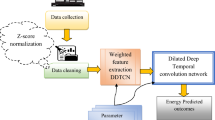Abstract
In this paper, a Conv-BiLSTM hybrid architecture is proposed to improve building energy consumption reconstruction of a new multi-functional building type. Experiments indicate that using the proposed hybrid architecture results in improved prediction accuracy for two case multi-functional buildings in ultra-short-term to short term energy use modelling, with \(R^2\) score ranging between 0.81 to 0.94. The proposed model architecture comprising the CNN, dropout, bidirectional and dense layer modules superseded the performance of the commonly used baseline deep learning models tested in the investigation, demonstrating the effectiveness of the proposed architectural structure. The proposed model is satisfactorily applicable to modelling multi-functional building energy consumption.
Access this chapter
Tax calculation will be finalised at checkout
Purchases are for personal use only
Similar content being viewed by others
References
Ahmad, M.W., Mouraud, A., Rezgui, Y., Mourshed, M.: Deep highway networks and tree-based ensemble for predicting short-term building energy consumption. Energies 11(12), 3408 (2018)
Ahmad, M.W., Mourshed, M., Yuce, B., Rezgui, Y.: Computational intelligence techniques for HVAC systems: a review. Build. Simul. 9, 359–398 (2016). https://doi.org/10.1007/s12273-016-0285-4
Ahmad, T., Chen, H., Huang, Y.: Short-term energy prediction for district-level load management using machine learning based approaches. Energy Procedia 158, 3331–3338 (2019)
Almalaq, A., Zhang, J.J.: Evolutionary deep learning-based energy consumption prediction for buildings. IEEE Access 7, 1520–1531 (2018)
Artuso, P., Santiangeli, A.: Energy solutions for sports facilities. International J. Hydrogen Energy 33(12), 3182–3187 (2008)
Berriel, R.F., Lopes, A.T., Rodrigues, A., Varejao, F.M., Oliveira-Santos, T.: Monthly energy consumption forecast: a deep learning approach. In: 2017 International Joint Conference on Neural Networks (IJCNN), pp. 4283–4290. IEEE (2017)
Bisong, E.: Google Colaboratory. In: Building Machine Learning and Deep Learning Models on Google Cloud Platform, pp. 59–64. Apress, Berkeley (2019). https://doi.org/10.1007/978-1-4842-4470-8_7
Brownlee, J.: Deep learning for time series forecasting: predict the future with MLPs. CNNs and LSTMs in Python, Machine Learning Mastery (2018)
Cai, M., Pipattanasomporn, M., Rahman, S.: Day-ahead building-level load forecasts using deep learning vs. traditional time-series techniques. Appl. Energy 236, 1078–1088 (2019)
Chollet, F., et al.: Keras documentation. keras. io, vol. 33 (2015)
Fan, C., Wang, J., Gang, W., Li, S.: Assessment of deep recurrent neural network-based strategies for short-term building energy predictions. Appl. Energy 236, 700–710 (2019)
Gers, F.A., Schmidhuber, J.: Recurrent nets that time and count. In: Proceedings of the IEEE-INNS-ENNS International Joint Conference on Neural Networks. IJCNN 2000. Neural Computing: New Challenges and Perspectives for the New Millennium, vol. 3, pp. 189–194. IEEE (2000)
Kim, T.Y., Cho, S.B.: Predicting residential energy consumption using CNN-LSTM neural networks. Energy 182, 72–81 (2019)
Krizhevsky, A., Sutskever, I., Hinton, G.E.: ImageNet classification with deep convolutional neural networks. Commun. ACM 60(6), 84–90 (2017)
Miao, K., Hua, Q., Shi, H.: Short-Term load forecasting based on CNN-BiLSTM with Bayesian optimization and attention mechanism. In: Zhang, Y., Xu, Y., Tian, H. (eds.) PDCAT 2020. LNCS, vol. 12606, pp. 116–128. Springer, Cham (2021). https://doi.org/10.1007/978-3-030-69244-5_10
Mocanu, E., Nguyen, P.H., Kling, W.L., Gibescu, M.: Unsupervised energy prediction in a smart grid context using reinforcement cross-building transfer learning. Energy Build. 116, 646–655 (2016)
Rahman, A., Srikumar, V., Smith, A.D.: Predicting electricity consumption for commercial and residential buildings using deep recurrent neural networks. Appl. Energy 212, 372–385 (2018)
Sajjad, M., et al.: A novel CNN-GRU-based hybrid approach for short-term residential load forecasting. IEEE Access 8, 143759–143768 (2020)
Schuster, M., Paliwal, K.K.: Bidirectional recurrent neural networks. IEEE Trans. Signal Process. 45(11), 2673–2681 (1997)
Ullah, F.U.M., Ullah, A., Haq, I.U., Rho, S., Baik, S.W.: Short-term prediction of residential power energy consumption via CNN and multi-layer bi-directional LSTM networks. IEEE Access 8, 123369–123380 (2019)
Wei, Y., et al.: A review of data-driven approaches for prediction and classification of building energy consumption. Renew. Sustain. Energy Rev. 82, 1027–1047 (2018)
Wen, L., Zhou, K., Yang, S., Lu, X.: Optimal load dispatch of community microgrid with deep learning based solar power and load forecasting. Energy 171, 1053–1065 (2019)
Yuce, B., Li, H., Rezgui, Y., Petri, I., Jayan, B., Yang, C.: Utilizing artificial neural network to predict energy consumption and thermal comfort level: an indoor swimming pool case study. Energy Build. 80, 45–56 (2014)
Author information
Authors and Affiliations
Corresponding author
Editor information
Editors and Affiliations
Rights and permissions
Copyright information
© 2021 Springer Nature Switzerland AG
About this paper
Cite this paper
Banda, P., Bhuiyan, M.A., Zhang, K., Song, A. (2021). Energy Consumption Prediction for Multi-functional Buildings Using Convolutional Bidirectional Recurrent Neural Networks. In: Paszynski, M., Kranzlmüller, D., Krzhizhanovskaya, V.V., Dongarra, J.J., Sloot, P.M. (eds) Computational Science – ICCS 2021. ICCS 2021. Lecture Notes in Computer Science(), vol 12746. Springer, Cham. https://doi.org/10.1007/978-3-030-77977-1_23
Download citation
DOI: https://doi.org/10.1007/978-3-030-77977-1_23
Published:
Publisher Name: Springer, Cham
Print ISBN: 978-3-030-77976-4
Online ISBN: 978-3-030-77977-1
eBook Packages: Computer ScienceComputer Science (R0)




